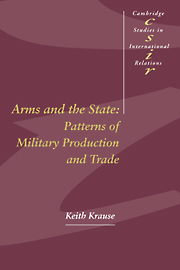Book contents
- Frontmatter
- Contents
- List of figures
- List of tables
- Acknowledgements
- Introduction
- 1 Motive forces in the evolution of the arms transfer and production system
- 2 The emergence of a global arms transfer and production system
- 3 From the Military Revolution to the Industrial Revolution
- 4 An overview of the post-1945 global arms transfer system
- 5 The dominance of first-tier producers and suppliers
- 6 Second-tier producers and suppliers: the struggle to keep pace
- 7 Dependent production and exports in the third tier
- 8 The subordinate role of arms recipients
- Conclusion
- Appendix: Arms transfer data sources and problems
- Notes
- Bibliography
- Index
7 - Dependent production and exports in the third tier
Published online by Cambridge University Press: 22 September 2009
- Frontmatter
- Contents
- List of figures
- List of tables
- Acknowledgements
- Introduction
- 1 Motive forces in the evolution of the arms transfer and production system
- 2 The emergence of a global arms transfer and production system
- 3 From the Military Revolution to the Industrial Revolution
- 4 An overview of the post-1945 global arms transfer system
- 5 The dominance of first-tier producers and suppliers
- 6 Second-tier producers and suppliers: the struggle to keep pace
- 7 Dependent production and exports in the third tier
- 8 The subordinate role of arms recipients
- Conclusion
- Appendix: Arms transfer data sources and problems
- Notes
- Bibliography
- Index
Summary
The rise of third-tier arms producers
Third-tier states are fundamentally motivated to produce arms by a desire to escape or ameliorate their subordinate position in the global arms transfer and production system. Although they are not completely powerless, the scale of the effort they can mount and their status as late entrants in the market condemns most of them to be frustrated in this quest. An examination of the evolution of third-tier arms production and exports through the contemporary period confirms both the imperfections in the process of technological diffusion and the evolutionary pattern of the global arms transfer and production system that was sketched in chapter 1. Third-tier producers can be identified by one of three criteria:
(a) they can only produce weapons at a level of sophistication far below the existing technological frontier.
(b) the sophisticated weapons that they can produce are restricted to only one or two weapons systems.
(c) they remain dependent upon imports of critical sophisticated subsystems, and little or no transfer of the knowledge required to go beyond the simple reproduction or copying of weapons occurs.
Although for the moment all arms-producing states in the developing world will be treated as members of the third tier, these criteria will allow a more subtle and dynamic picture to be drawn eventually that would allow for some (albeit rare) movement between tiers and that could elevate the potential status of some producers in the developing world.
- Type
- Chapter
- Information
- Arms and the StatePatterns of Military Production and Trade, pp. 153 - 181Publisher: Cambridge University PressPrint publication year: 1992



